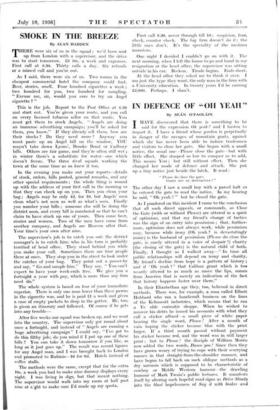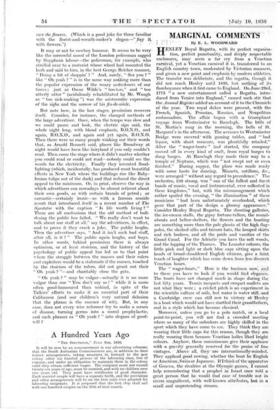IN DEFENCE OF " OH YEAH "
By SEAN O'FAOLAIN
IHAVE discovered that there is something to be said for the expression Oh yeah ? and I hasten to impart it. I have a friend whose garden is perpetually in danger of the ravages of mountain goats, against which she has never been able to induce tradesmen and visitors to close her gate. She began with a small notice, the usual one—Please close the gate—but with little effect. She stooped so low to conquer as to add, This means You ; but still without effect. Then she changed her mode of defence and attack. She put up a tiny notice just beside the latch. It read :
" Please do close the gate.
Goats are so destructive !"
The other day I saw a small boy with a parcel halt as he entered the gate to read the notice. Iu my hearing he said, " Oh yeah ? " but lie closed the gate.
As I pondered on this incident I came to the conclusion that all such direct appeals, or commands, as Close the Gate (with or without Please) are uttered in a spirit of optimism, and that my friend's change of tactics was the sign of an entry into pessimism ; that, further- more, optimism does not always work, while pessimism may, because while irony (Oh yeah ? is devastatingly ironic) is the husband of pessimism (Please do close the gate, is surely uttered in a voice of despair ?) charity (the closing of the gate) is the natural child of both. Finally, I thought as I walked away—" In time all public relationships will depend on irony and charity. My friend's decline from hope is a pattern of history ; and if Oh yeah ? ' that Caliban grunt which is too wearily uttered to as much as move the lips, comes from America that is merely an indication of the fact that history happens faster over there."
In their Elizabethan age they, too, believed in direct methods. There was, for example, a man called Elbert Hubbard who ran a handicraft business on the lines of the Kelmscott industries, which means that he ran a Ye olde curiositie shoppe. When he wished to recover his debts he issued his accounts with what they call a sticker affixed—a small piece of white paper bearing the single word, Please ! After a month of vain hoping the sticker became blue with the print larger. If a third month passed without payment his sticker became red, and the word was in still larger print ; but to Please ! the disciple of William Morris now added the two words, Damn you! Since then they have grown weary of trying to cope with their scurrying masses in that straight-from-the-shoulder manner, and have begun to fall back on such oblique methods as a dry sarcasm which is supposed to be characteristic of cowboy or Middle Western humour—the drawling humour of Mark Twain's public lectures. It manifests itself by altering such hopeful road-signs as Drive Slowly into the blasé hopelessness of Say it with brakes and save the flowers. (Which is a good joke for those familiar MARGINAL COMMENTS with the florist-and-wreath-maker's slogan—" Say ift with flowers.") It may or not be cowboy humour. It seems to be very like the sorrowful mood of the London policeman sagged by Sisyphean labour—the policeman, for eXample, who strolled over to a motorist whose wheel had mounted the kerb and said to him, in the best George ,Belcher manner, " Doing a bit of shoppin' ? " And, surely, " Sez you ? " like " Oh yeah ? " is in the same way nothing more than the popular expression of the weary wettsolunerz of our times ; just as Oscar Wilde's " too-too," and " too utterly utter" (acidulously rehabilitated by Mr. Waugh as " too sick-making ") was the aristocratic expression of the sighs and the sorrow of his fin-de-sigele.
But note how, in the last stages, pessimism recovers itself. Consider, for instance, the changed methods of the large advertiser. Once, when the tempo was slow and we could pause and look, the electric sign said, the whole night long, with bland emphasis, B.O.X.O., and again, B.O.X.O., and again and yet again, 13.0.X.O. Then there were so many people winking out their words that, as Arnold Bennett said, places like BroadWay at night would have been like fairyland if you only couldn't read. Then came the stage where it didn't matter whether you could read or could not read—nobody could see the words for the electricity. Finally they invented flood- lighting (which, incidentally, has produced most beautiful effects in New York where the buildings rise like Baby- lonian tulips out of the dark) and that reduced the direct appeal to the minimum. Or, in print, observe the way in which advertisers can nowadays be almost reticent about their own goods, as with certain brands of petrol ; or sarcastic—certainly ironic—as with a famous seaside ,resort that introduced., tself in a recent number of The Spectator with the caption " Is life worth living ? " These are all confessions that the old method of bull- dosing the public has failed. " We really don't want to talk about our stuff at all," say the advertisers, in effect, and to prove it they crack a joke. The public laughs. Then the advertiser says, " And it isn't such bad stuff, after all, is it ? " The public again laughs, and buys. In other words, behind pessimism there is always optimism, or at least stoicism, and the history of the psychology of public appeal has led us to that point where the struggle between the masses and their rulers and exploiters would be a stalemate if the masses, touched by the stoicism of- the rulers, did not grunt out their ".Oh yeah ? "—and charitably close the gate.
" Oh yeah ? " may be vulgar—actually it is no more vulgar than our " You don't say so ! " while it is more often good-humoured than unkind, in spite cf the Talkies' efforts . to make it an essential part of their Calibanese (and our children's very natural delusion that the phrase is the essence of wit). But, in any case, does not every wise reformer try to make a serum of disease, turning germs into a moral prophylactic, and such phrases as " Oh yeah ? " into slogans of good- will ?











































 Previous page
Previous page